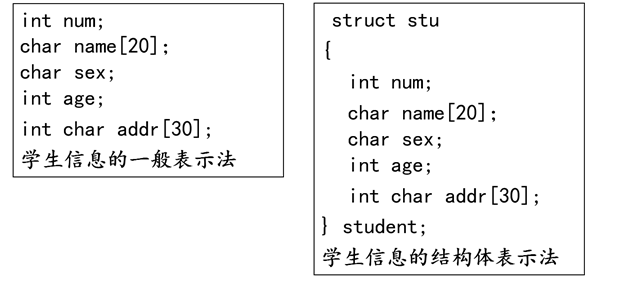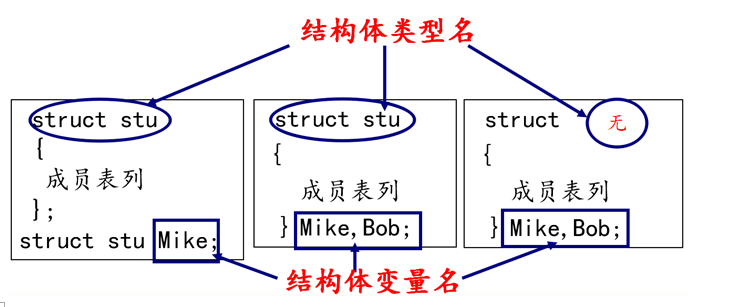C language has four types of compound, which are described in turn below.
Articles Catalogue
structural morphology
Summary
Array: Describes an ordered set of data of the same type used to process a large number of data operations of the same type.
Sometimes we need to combine different types of data into an organic whole, such as: a student has attributes such as school number/name/gender/age/address. Obviously, it is very complicated to define the above variables separately and the data is not easy to manage.

Definition and initialization of structural variables
How structural variables are defined:
- Declare the structure type before defining the variable name
- Define variables while declaring types
- Direct Definition of Structural Type Variables (Untyped Names)

Structure type and structure variable relationship:
- Structural Type: Specifies a structure type that corresponds to a model, but does not contain specific data, nor does the system allocate actual memory units to it.
- Structural variables: The system allocates space according to the type of structure (internal member status).
//Definition of Structural Type struct stu { char name[50]; int age; }; //Define the type first, then the variable (commonly used) struct stu s1 = { "mike", 18 }; //Define types and variables at the same time struct stu2 { char name[50]; int age; }s2 = { "lily", 22 }; struct { char name[50]; int age; }s3 = { "yuri", 25 };
Use of Structural Members
#include<stdio.h> #include<string.h> //Definition of Structural Type struct stu { char name[50]; int age; }; int main() { struct stu s1; //If it is a normal variable, the structure members are manipulated by a point operator strcpy(s1.name, "abc"); s1.age = 18; printf("s1.name = %s, s1.age = %d\n", s1.name, s1.age); //If it is a pointer variable, manipulate the structure members by - >. strcpy((&s1)->name, "test"); (&s1)->age = 22; printf("(&s1)->name = %s, (&s1)->age = %d\n", (&s1)->name, (&s1)->age); return 0; }
Structural array
#include <stdio.h> //Statistical achievement struct stu { int num; char name[20]; char sex; float score; }; int main() { //Define and initialize an array of structured bodies with five elements struct stu boy[5] = { { 101, "Li ping", 'M', 45 }, { 102, "Zhang ping", 'M', 62.5 }, { 103, "He fang", 'F', 92.5 }, { 104, "Cheng ling", 'F', 87 }, { 105, "Wang ming", 'M', 58 }}; int i = 0; int c = 0; float ave, s = 0; for (i = 0; i < 5; i++) { s += boy[i].score; //final scoring if (boy[i].score < 60) { c += 1; //Statistics of failures } } printf("s=%f\n", s);//Print total score ave = s / 5; //Calculate the average score printf("average=%f\ncount=%d\n\n", ave, c); //Print average score and number of failures for (i = 0; i < 5; i++) { printf(" name=%s, score=%f\n", boy[i].name, boy[i].score); // printf(" name=%s, score=%f\n", (boy+i)->name, (boy+i)->score); } return 0; }
Structural sleeve structure
#include <stdio.h> struct person { char name[20]; char sex; }; struct stu { int id; struct person info; }; int main() { struct stu s[2] = { 1, "lily", 'F', 2, "yuri", 'M' }; int i = 0; for (i = 0; i < 2; i++) { printf("id = %d\tinfo.name=%s\tinfo.sex=%c\n", s[i].id, s[i].info.name, s[i].info.sex); } return 0; }
Structural body assignment
#include<stdio.h> #include<string.h> //Definition of Structural Type struct stu { char name[50]; int age; }; int main() { struct stu s1; //If it is a normal variable, the structure members are manipulated by a point operator strcpy(s1.name, "abc"); s1.age = 18; printf("s1.name = %s, s1.age = %d\n", s1.name, s1.age); //Two structural variables of the same type can be assigned to each other. //Copy the value of s1 member variable to the memory of s2 member variable //s1 and s2 are just the same values as the member variables. They are two variables that are not related. struct stu s2 = s1; //memcpy(&s2, &s1, sizeof(s1)); printf("s2.name = %s, s2.age = %d\n", s2.name, s2.age); return 0; }
Structures and pointers
1) A pointer to the variables of ordinary structures
#include<stdio.h> //Definition of Structural Type struct stu { char name[50]; int age; }; int main() { struct stu s1 = { "lily", 18 }; //If it is a pointer variable, manipulate the structure members by - >. struct stu *p = &s1; printf("p->name = %s, p->age=%d\n", p->name, p->age); printf("(*p).name = %s, (*p).age=%d\n", (*p).name, (*p).age); return 0; }
2) Reactor Area Structural Volume Variables
#include<stdio.h> #include <string.h> #include <stdlib.h> //Definition of Structural Type struct stu { char name[50]; int age; }; int main() { struct stu *p = NULL; p = (struct stu *)malloc(sizeof(struct stu)); //If it is a pointer variable, manipulate the structure members by - >. strcpy(p->name, "test"); p->age = 22; printf("p->name = %s, p->age=%d\n", p->name, p->age); printf("(*p).name = %s, (*p).age=%d\n", (*p).name, (*p).age); free(p); p = NULL; return 0; }
3) First-order pointer of structure sleeve
#include<stdio.h> #include <string.h> #include <stdlib.h> //Definition of Structural Type struct stu { char *name; //Primary pointer int age; }; int main() { struct stu *p = NULL; p = (struct stu *)malloc(sizeof(struct stu)); p->name = malloc(strlen("test") + 1); strcpy(p->name, "test"); p->age = 22; printf("p->name = %s, p->age=%d\n", p->name, p->age); printf("(*p).name = %s, (*p).age=%d\n", (*p).name, (*p).age); if (p->name != NULL) { free(p->name); p->name = NULL; } if (p != NULL) { free(p); p = NULL; } return 0; }
Structures as function parameters
1) Ordinary variables of structure as function parameters
#include<stdio.h> #include <string.h> //Definition of Structural Type struct stu { char name[50]; int age; }; //Function parameters are general variables of structure void set_stu(struct stu tmp) { strcpy(tmp.name, "mike"); tmp.age = 18; printf("tmp.name = %s, tmp.age = %d\n", tmp.name, tmp.age); } int main() { struct stu s = { 0 }; set_stu(s); //pass by value printf("s.name = %s, s.age = %d\n", s.name, s.age); return 0; }
2) Structural Pointer Variables as Functional Parameters
#include<stdio.h> #include <string.h> //Definition of Structural Type struct stu { char name[50]; int age; }; //Function parameter is pointer variable of structure void set_stu_pro(struct stu *tmp) { strcpy(tmp->name, "mike"); tmp->age = 18; } int main() { struct stu s = { 0 }; set_stu_pro(&s); //Address delivery printf("s.name = %s, s.age = %d\n", s.name, s.age); return 0; }
3) Structural array names as function parameters
#include<stdio.h> //Definition of Structural Type struct stu { char name[50]; int age; }; //void set_stu_pro(struct stu tmp[100], int n) //void set_stu_pro(struct stu tmp[], int n) void set_stu_pro(struct stu *tmp, int n) { int i = 0; for (i = 0; i < n; i++) { sprintf(tmp->name, "name%d%d%d", i, i, i); tmp->age = 20 + i; tmp++; } } int main() { struct stu s[3] = { 0 }; int i = 0; int n = sizeof(s) / sizeof(s[0]); set_stu_pro(s, n); //Array name passing for (i = 0; i < n; i++) { printf("%s, %d\n", s[i].name, s[i].age); } return 0; }
4)const Modified Pointer Parametric Variables of Structures
//Definition of Structural Type struct stu { char name[50]; int age; }; void fun1(struct stu * const p) { //p = NULL; //err p->age = 10; //ok } //void fun2(struct stu const* p) void fun2(const struct stu * p) { p = NULL; //ok //p->age = 10; //err } void fun3(const struct stu * const p) { //p = NULL; //err //p->age = 10; //err }
Common Community (Commonwealth)
On Commons/Communities
- Joint union is a type of data that can store different types of data in the same storage space.
- The length of memory occupied by a consortium is equal to the length of its longest member, which is also called a common body.
- The same memory segment can be used to store several different types of members, but only one function at each instant.
- The member that plays a role in the common variable is the last member stored, and the value of the original member will be overwritten when a new member is stored.
- The address of the common variable and the address of its members are the same address.
#include <stdio.h> //Commons are also called consortia. union Test { unsigned char a; unsigned int b; unsigned short c; }; int main() { //Define Common Volume Variables union Test tmp; //1. The first address of all members is the same. printf("%p, %p, %p\n", &(tmp.a), &(tmp.b), &(tmp.c)); //2. The size of the shared body as the largest member type printf("%lu\n", sizeof(union Test)); //3. A member assignment affects another member //High on the left and low on the right //Lower address, higher address tmp.b = 0x44332211; printf("%x\n", tmp.a); //11 printf("%x\n", tmp.c); //2211 tmp.a = 0x00; printf("short: %x\n", tmp.c); //2200 printf("int: %x\n", tmp.b); //44332200 return 0; }
enumeration
Enumeration: List the values of variables one by one. The values of variables are limited to the range of the values listed.
Enumeration type definition:
enum enumeration
{
Enumeration table
};
All available values, also known as enumeration elements, should be listed in the enumeration value table.
Enumeration values are constants and cannot be assigned to programs with assignment statements.
The enumeration element itself is defined by the system as a numeric value representing the ordinal number from 0 to 0, 1, 2...
#include <stdio.h> enum weekday { sun = 2, mon, tue, wed, thu, fri, sat } ; enum bool { flase, true }; int main() { enum weekday a, b, c; a = sun; b = mon; c = tue; printf("%d,%d,%d\n", a, b, c); enum bool flag; flag = true; if (flag == 1) { printf("flag To be true\n"); } return 0; }
typedef
Typeedef is the key word of C language. Its function is to define a new name for a data type (basic type or custom data type), and it cannot create a new type.
- Unlike # define, typedef is limited to data types, not expressions or specific values.
- # define occurs in preprocessing, typedef occurs in compilation
#include <stdio.h> typedef int INT; typedef char BYTE; typedef BYTE T_BYTE; typedef unsigned char UBYTE; typedef struct type { UBYTE a; INT b; T_BYTE c; }TYPE, *PTYPE; int main() { TYPE t; t.a = 254; t.b = 10; t.c = 'c'; PTYPE p = &t; printf("%u, %d, %c\n", p->a, p->b, p->c); return 0; }